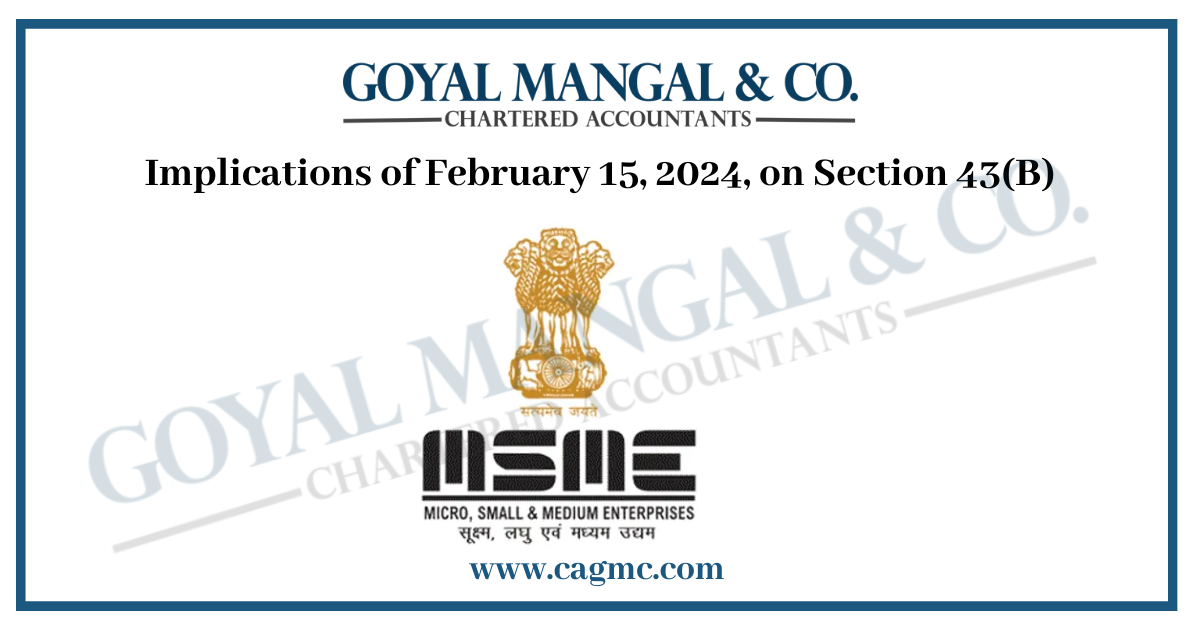
Do you have a pile of invoices from your smaller vendors? Beware, my friend, because a recent tax regulation has made delays in payments even more costly. Delays in settling bills for MSMEs can now have a detrimental impact on your profits due to the recent changes in Section 43B(h) of the Income Tax Act, 1961. We must stop avoiding the issue! This blog covers all the essential information regarding the application of Section 43B(h) MSME amendment and why date 15th Feb is important for this section and explains why it is not only beneficial for your business but also advantageous from a tax perspective to pay your MSME suppliers on time.
| Table of Contents |
Overview of Section 43B(H) of Income Tax Act, 1961
Section 43B(h) applicability has been included in the Income Tax Act, 1961 with the intention to promote social and economic well-being of small and medium businesses, as well as to guarantee timely payments. Ensure timely payment! According to Section 15 of the MSME Development Act, larger corporations are required to settle their dues to smaller enterprises within a maximum of 45 days in order to qualify for tax advantages associated with such transactions. There are forms need to file like E form MSME -1.
Late payments come at a cost to you. The tax deduction will be disallowed for payments made to MSME vendors that exceed the 45-day deadline. Consider it as aiding small enterprises to maintain their well-being while also benefiting from a tax deduction in return. The invoices that are received in 23-24 financial year that is invoices received till 15-02-2023 need to be paid till 31-03-2024.
Types of Enterprises as per Section 43B(H)
There are 3 types of enterprise based on investment and turnover as per MSME Development Act, 2006 to whom Section 43b MSME amendments are applicable:
- Micro Enterprises: Picture a vendor selling pickles from her cart. Her ingredients and equipment cost less than Rs. 1 crore, and her annual sales barely touch Rs. 5 crores. This tiny but mighty business is what we call a “micro enterprise.”
- Small Enterprise: Now see a bookstore loaded with curated reads. Their shelves and inventory might be less then Rs. 10 crores, and their sales can climb up to Rs. 50 crores. This “small enterprise” is steadily growing and leaving its mark on the literary world.
- Medium Enterprise: Finally, visualize an electronics store showcasing the latest gadgets. Their technology and infrastructure investments stay below Rs. 20 crores, and their sales land within Rs. 100 crores. This “medium enterprise” is a driving force, employing teams and constantly innovating, one circuit board at a time.

Situations in which the 43(B)h rule is not applicable.
Section 43(B) h of Income Tax applicability does not apply in case of below conditions:
- If a defect in the goods or a defect in the service is found, a written objection must be submitted within 15 days. The date on which the seller raised the objection must also be recorded in the records, as the countdown to the due date will begin from that date.
- As per OM Policy 5/2(2)/2021-E/P & G/dated 02-07-2021, wholesale and retail traders are entitled to apply for Udyam only for the benefit of priority lending to industry. Therefore, purchases from sellers will not be covered by these amendments.
- If you, as a business, issue a cheque to a smaller supplier (MSME) before the due date but they don’t cash it on time, you might still be safe from tax issues under Section 43B. This happened in a court case (Hindustan Wire Products Ltd. vs. Income Tax Commissioner).
- However, you need to prove you paid on time: Have a copy of the cheque with the payment date, show proof of delivering the cheque to the supplier within the deadline.
- Remember, just issuing a cheque isn’t enough. Make sure the supplier receives it on time!
Conclusion
In conclusion, the main message is to ensure timely payment to your MSME vendors. This practice is beneficial for their financial stability, promotes positive karma, and now, with the inclusion of Section 43B(h), it also benefits your tax obligations. Don’t forget, a balanced ecosystem begins with equitable rules, and now, with this recent regulation, the competition has become more equitable. Therefore, we should show our backing for small enterprises, ensure everyone’s satisfaction, and witness our personal finances flourish.


